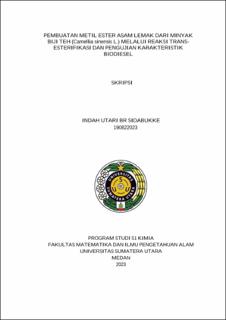| dc.description.abstract | The production of fatty acid methyl esters (FAME) from tea seed oil (Camellia sinensis L.) through the transesterification reaction has been successfully carried out. Tea seed oil extraction was carried out using n-Hexane solvent with a yield of 20.09%. Based on the analysis of the composition of the fatty acids, oleic fatty acids and palmitic fatty acids were the most dominant constituents of the oil with a percentage of 43.99% and 38.79% respectively. The resulting tea seed oil has a free fatty acid content of 1.05% and a moisture content of 0.09% so that it can be transesterified directly. The transesterification reaction was carried out using a KOH catalyst which was dissolved in methanol to form a homogeneous catalyst system. In this study, the effect of variations in catalyst concentration (1%, 1.5%, and 2%), and molar oil:methanol (1:6 g/g, 1:9 g/g, and 1:12 g/g) was analyzed on the resulting FAME product. The results of functional group analysis using FT-IR showed the success of the reaction in the presence of C-O-C ester absorption at wave number 1062.2 cm-1. The chromatogram of FAME shows that overall the FAME produced has a high level of purity where each variation produces a methyl ester conversion of 98,58%, 99,68%, 98,26%, 98,47% and 97,92%. The yield obtained by each variation was 84,98%, 85,02%, 85,06%, 85,97% and 84,32%. The FAME obtained through the transesterification reaction has the following characteristics: specific gravity 860.2 kg/m³, viscosity 4.4769 cSt, acid number 0.40 mg KOH/100 g, cetane number 55.4, iodine number 72.27 g I2/100 g, flash point 171.5°C, moisture content 0.031%. The results of the analysis of physico-chemical characteristics show that this FAME can be categorized as biodiesel which can be used as an alternative to biodiesel fuel in accordance with SNI 7182:2015 concerning biodiesel quality standards. | en_US |




